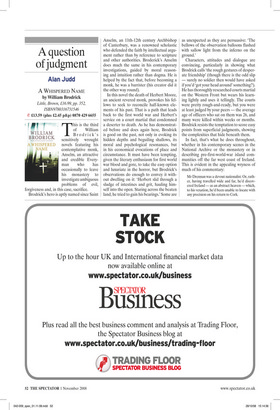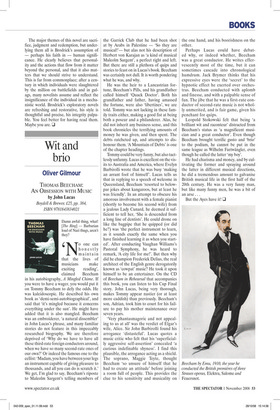A question of judgment
Alan Judd
A WHISPERED NAME by William Brodrick Little, Brown, £16.99, pp. 352, ISBN9780316731546 ✆ £13.59 (plus £2.45 p&p) 0870 429 6655 This is the third of William B r o d r i c k ’ s sensitively wrought novels featuring his contemplative monk, Anselm, an attractive and credible Everyman who has occasionally to leave his monastery to investigate ambiguous problems of evil, forgiveness and, in this case, sacrifice.
Brodrick’s hero is aptly named since Saint Anselm, an 11th-12th century Archbishop of Canterbury, was a renowned scholastic who defended the faith by intellectual argument rather than by reference to scripture and other authorities. Broderick’s Anselm does much the same in his contemporary investigations, guided by moral reasoning and intuition rather than dogma. He is helped by the fact that, before becoming a monk, he was a barrister (his creator did it the other way round).
In this novel the death of Herbert Moore, an ancient revered monk, provokes his fellows to seek to reconcile half-known elements of his past. That is a path that leads back to the first world war and Herbert’s service on a court martial that condemned a deserter to death. As he has demonstrated before and does again here, Brodrick is good on the past, not only in evoking its hidden depths and beguiling shallows, its moral and psychological resonances, but in his economical evocations of place and circumstance. It must have been tempting, given the literary enthusiasm for first world war blood and gore, to take the easy option and luxuriate in the horror, but Brodrick’s observations do enough to convey it without dwelling on it: ‘Herbert slid through a sludge of intestines and grit, hauling himself into the open. Staring across the beaten land, he tried to gain his bearings.’ Some are as unexpected as they are persuasive: ‘The bellows of the observation balloons flashed with sallow light from the inferno on the ground.’ Characters, attitudes and dialogue are convincing, particularly in showing what Brodrick calls ‘the rough gestures of desperate friendship’ (though there is the odd slip — surely no soldier then would have asked if you’d ‘got your head around’ something?). He has thoroughly researched courts martial on the Western Front but wears his learning lightly and uses it tellingly. The courts were pretty rough-and-ready, but you were at least judged by your peers — the average age of officers who sat on them was 26, and many were killed within weeks or months. Brodrick resists the temptation to score easy points from superficial judgments, showing the complexities that hide beneath them.
In fact, that’s what he does throughout, whether in his contemporary scenes in the National Archive or the monastery or in describing pre-first-world-war island communities off the far west coast of Ireland. This is evident in the appealing wryness of much of his commentary:
Mr Drennan was a devout nationalist. Or, rather, having travelled wide and far, he’d discovered Ireland — as an abstract heaven — which, to his vexation, he’d been unable to locate with any precision on his return to Cork.
The major themes of this novel are sacrifice, judgment and redemption, but underlying them all is Brodrick’s assumption of — perhaps his faith in — human significance. He clearly believes that personality and the actions that flow from it matter beyond the personal, and that it also matters that we should strive to understand. This is far from commonplace; after a century in which individuals were slaughtered by the million on battlefields and in gulags, many novelists assume and reflect the insignificance of the individual in a mechanistic world. Brodrick’s exploratory novels are refreshing and restorative, his style is thoughtful and precise, his integrity palpable. You feel better for having read them. Maybe you are. ❑



































































































 Previous page
Previous page